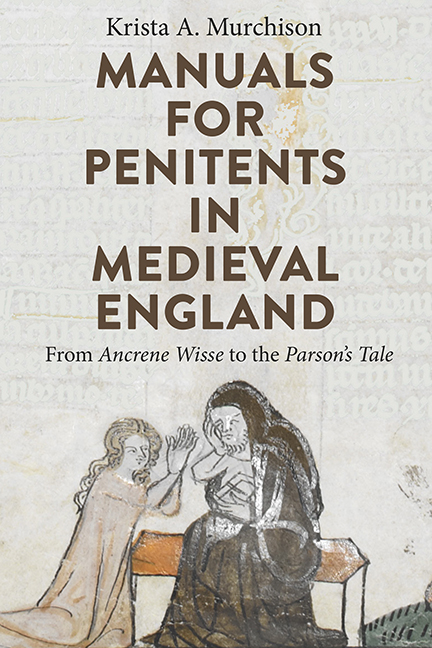Book contents
- Frontmatter
- Contents
- Acknowledgements
- Abbreviations
- Note on the Translation and Treatment of Texts
- A Chronological List of Key Manuals for Penitents and Associated Works
- Introduction: Teaching Sin
- Part I Self-Examination Writing before 1250
- Part II Manuals for Penitents, 1250–1300
- Part III Manuals for Penitents, 1300–1350
- ‘To enden in som vertuous sentence’: Concluding with Chaucer’s Parson
- Bibliography
- Index
‘To enden in som vertuous sentence’: Concluding with Chaucer’s Parson
Published online by Cambridge University Press: 07 October 2022
- Frontmatter
- Contents
- Acknowledgements
- Abbreviations
- Note on the Translation and Treatment of Texts
- A Chronological List of Key Manuals for Penitents and Associated Works
- Introduction: Teaching Sin
- Part I Self-Examination Writing before 1250
- Part II Manuals for Penitents, 1250–1300
- Part III Manuals for Penitents, 1300–1350
- ‘To enden in som vertuous sentence’: Concluding with Chaucer’s Parson
- Bibliography
- Index
Summary
Chaucer's Parson, who notably refuses to tell a ‘tale’ but instead offers a lengthy exposition on sin and confession, has been read as a Promethean figure bringing the high ‘Latinate’ theology of sin to the uneducated masses – either the travelling group of pilgrims or Chaucer's actual medieval audience. According to this view, the Parson's Tale is unusual and potentially subversive, because it operates as an ‘academic treatise’ in the vernacular. Proponents of this view include Derrick G. Pitard, who claims that the Parson's Tale functions as an ‘academic’ text because it is ‘a translation and compilation of three Latin penitential tracts originally intended for use by clerics’, it contains ‘internal references to various academic authorities, including Saint Jerome, Saint Bernard, Saint Augustine, and of course the Bible’, it ‘exhibits a dearth, and hence an apparent mistrust, of narrative plotting and poetic imagery’, and because it contains ‘a hierarchically organized, encyclopedic attention to detail’. Pitard writes that these supposedly ‘academic’ elements make the Parson's Tale distinctive among texts in English – ‘the language of the illiterati, a language with little or no academic tradition’. He argues that, ‘Before the last half of the fourteenth century, and especially the last quarter, academic treatises on religious matters intended for lay consumption are rare’.
Related to this view is the claim that the Parson's Tale is unusual among works on sin in that it places a powerful emphasis on the inner life. So, Katherine C. Little suggests that the Parson's Tale is unique among contemporary theological guides in the vernacular in its emphasis on contrition and in its interest in the ways in which the vernacular shapes the self. This suggestion, that the tale encourages a profound interest in the self, sounds much like Pitard's claim that the tale encourages penitents to ‘become their own interpreters’.
These models, by variously reading the Parson as the purveyor of previously inaccessible forms of academic thought and a particularly modern form of self-reflexivity, cast the Parson – and through him, Chaucer – as a harbinger of intellectualism and modernity. As such, these models participate in a broader pattern of reading Chaucer as a quintessentially modern figure – one who celebrated the kinds of self-reflexivity and freedom of thought that are now associated with modernity in the face of a restrictive medieval Church that unilaterally imposed uniformity and control upon medieval civilization.
- Type
- Chapter
- Information
- Manuals for Penitents in Medieval EnglandFrom <i>Ancrene Wisse</i> to the <i>Parson’s Tale</i>, pp. 144 - 150Publisher: Boydell & BrewerPrint publication year: 2021



